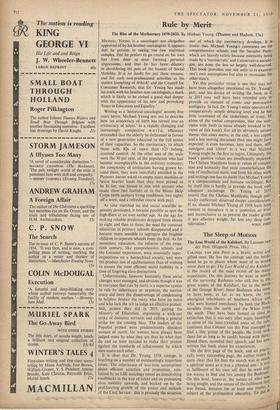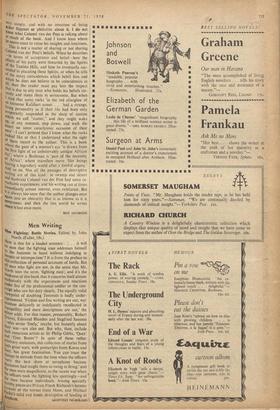The Sleep of Motion
The Lost World of the Kalahari. By Laurens van der Post. (Hogarth Press, 18s.) COLONEL VAN DER POST is a brave, active and gifted man. He has the courage and the hardi- hood to go to places where most of us would never dare to go; The Lost World of the Kalahari is the record of the most recent of his many expeditions. On this journey he went in search of the surviving Bushmen who still live in the great wastes of the Kalahari, far to the north of the Orange River; those Bushmen who seem to have been, as far as we know, the true aboriginal inhabitants of Southern Africa and who were hunted mercilessly by both the Black invaders from the north and the White from the south. They have been hunted so close .10 extinction that it was only after many hardships in some of the least-travelled areas of the sub' continent that Colonel van der Post managed to find a tiny group of the people. He lived with them for as long as he could; hunted with theme filmed them, recorded their speech; and has now written this book about his experiences. On the first page of the book, and on practi- cally every succeeding page, the author makes quite clear that for him the search was as much a spiritual quest as it was a physical one : it Was in fulfilment of his own self that he went into the wastes to find and live among the Bushmen. On this level, however, the nature of what wa,s being sought, and the nature of the fulfilment that was found, remains for at least one reader subject of the profoundest obscurity. To put vFrY simply, and with no intention of being either flippant or philistine about it, I do not k. now what Colonel van der Post is talking about to much of the book. And I know least where he seems most to value his insights and intuitions. This is not a matter of sharing or not sharing Colonel van der Post's beliefs. When he describes —IR terms of acceptance and belief—how the efforts of his party were thwarted by the Spirits of the Tsolido Hills, and how he eventually suc- ceeded in placating these Spirits; or when he tells er the many coincidences which befell him and which he does not believe to be coincidences at 411. then the reader must pay him the respect that is due to arty man who holds his beliefs sin- cerely and states them in seriousness. But when
read that some rocks 'in the red afterglow of
living411
trnmense Kalahari sunset . . . had a strange,
personality as if their life had been only temporarily suspended in the sleep of motion which we call "matter," and they might wake IP; at any moment, step down, and walk the desert on some cataclysmic occasion of their °wo'—I can't pretend that I know what the rocks looked like or that I understand what the sight of them meant to the author. This is a book Where the gaze of a woman's eye 'is drawn from the first light of an unbelievably antique African daY.; where a Bushman is 'part of the necessity °1 Africa': where travellers move 'like beings leaving a legendary world after a fateful argosy.' And so on. Not all the passages of descriptive Writing are of this kind : in swamp and desert and bushveld Colonel van der Post had some re- markable experiences, and his writing can at times immediately arouse interest, even exhilarate. But It ISalways too soon that the author plunges once `'bate into an obscurity that is as intense as it is Portentous; and then the lost world he writes about is lost once more.
DAN JACOBSON















































































 Previous page
Previous page